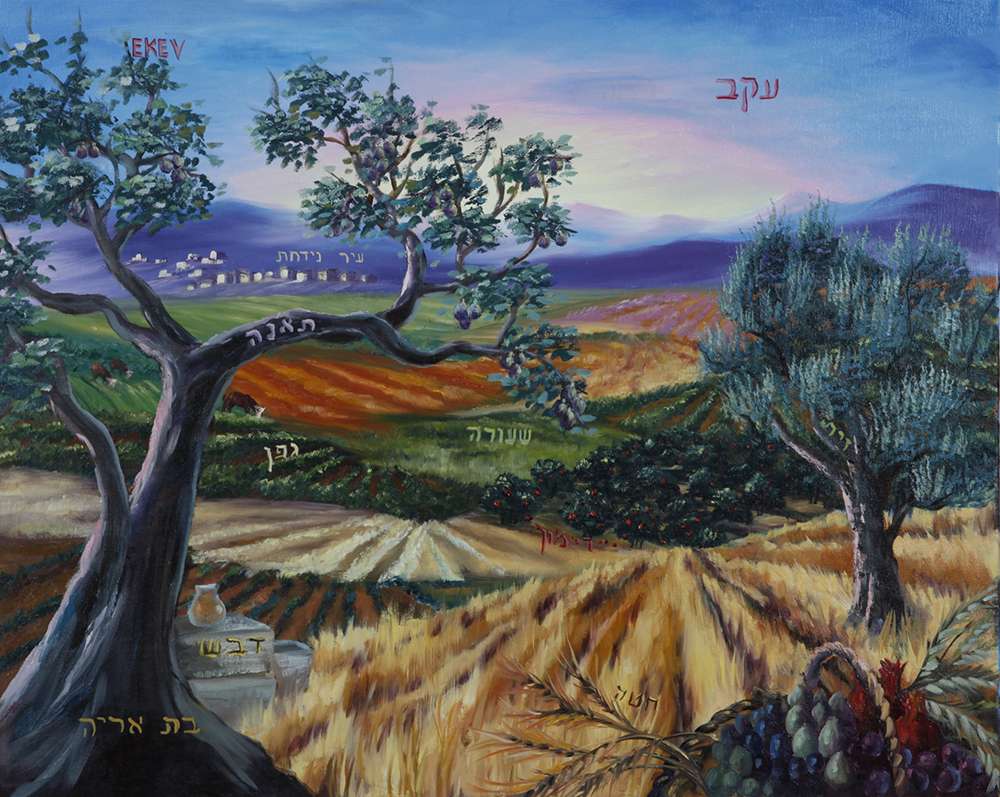Moshe taught Bnei-Yisrael how to truly understand each Mitzvah regardless of its “weight” and importance. The laws of our Miztvot are profound and follow a simple rule called “Kalah KeVaChamurah” (“קלה כבחמורה”), meaning each Mitzvah is equal and hold the same value and importance in HaShem’s eyes regardless of our understandings. One must always perform each Mitzvah with the same enthusiasm and dedication, as we never know which Mitzvah can change our life and destiny. Moshe told Bnei-Yisrael that if they keep the Mitzvot as obligated, they will merit the promise made to our Forefathers. HaShem will love and multiply them, and He will bless the fruit of their womb, and the fruit of their land. The word “Eikev” “עקב” in gematria is 172 alluding to the total of words in our Ten Commandments which is 172. The Ten Commandments aside from being the basis of the Divine Laws, these commandments contain 620 letters which alludes to the word KETER. tThe word “Keter” “כתר” (crown) is 620 in numerical value, alluding to HaShem’s glory.
The word describing our Parasha is “Eikev” (“עקב”) which also spells the word “Keva” (“קבע”), constant, meaning that if Bnei-Yisrael will steadily keep HaShem’s laws, they will then be permanent dwellers of the Holy Land. On the other hand, the word “Eikev” also spells the word “Beka”, broken, meaning that in the event Bnei-Yisrael will not keep the Mitzvot as obligated, HaShem then will brake his promised and they will be exiled. This prophecy came true in our own time, as many of Bnei-Yisrael do not keep the Mitzvot and we are spread all over the world, and both Beit-HaMikdash were destroyed (“Beka” – broken). The word “Eikev” literally means “heel” and can also be understood as “the consequence of” or “the result of.” The result of Bnei-Yisrael following HaShem’s rules means that they will continue to enjoy the benefits of the covenant made by HaShem with Avraham, Yitzchak, and Yaakov. The word “Eikev” also spells the word “Beka”, alluding to the Half-Shekel that was donated by Bnei-Yisrael to help with maintaining Beit-HaMikdash and was used for counting Bnei-Yisrael.
Parashat EikevThe word “Eikev” (“עקב”) can be also be understood as we must constantly “walk” (grow spiritually) in order keep all the Mitzvot and follow HaShem and the Torah. We shall always learn more in order to merit having HaShem in our lives every day. When rearranging the letters of the word “Eikev” it will spell “Keva” (“קבע”), meaning a specific time set for the study of the Torah. We also know that the word “Eikev” comes from the name “Yaakov”, meaning that we will merit all the blessings that Yaakov blessed his sons, the 12 tribes of Bnei-Yisrael.
King David once said that he is more concerned of the so-called “small Mitzvot” rather to than the bigger ones, as he knew that everyone understood and feared the “big Mitzvot”.
Moshe proclaimed to Bnei-Yisrael that if they keep HaShem’s laws and Mitzvot, HaShem will keep his promises in return. The Torah lists all that HaShem will provide Bnei-Yisrael with while they obey his laws; these rewards are tangible rewards and provide for immediate benefits. Moshe says to Bnei-Yisrael that HaShem will “give” the land without any need to fight the current inhabitants of the Promised Land. This is a profound miracle of having HaShem “delivering” their enemies without a fight. Moshe promised that the miracles that were about to happen when Bnei-Yisrael enter the Promised Land will be even greater than the ones in Egypt.
We learn from the order of words “דְּגָנְךָ וְתִירֹשְׁךָ וְיִצְהָרֶךָ” (verse 13) the divine order of growth and the order of when these fruits, grain and olives are ripe and ready to be eaten. First we harvest the grains, then the grapes and thereafter the olives according to the seasons.
In verse 13 Moshe spoke of all the ten blessings HaShem will bestow upon Bnei-Yisrael as they will be receiving in the merit of observing the Ten Commandments. HaShem promises that Bnei-Yisrael will be blessed more than any other nation in the world, when keeping his laws and Mitzvot. Moshe listed the blessings and once again emphasized the importance of treating each Mitzvah equally. In verse 8:1 we notice how HaShem truly considers all the Mitzvot as one, as the Torah writes “Kol HaMitzvah” (“כל המצוה”), meaning all the Mitzvot are as one and shall be treated as such. This is a profound teaching of how we are obligated to truly fulfill each Mitzvah as if it is representing all the Mitzvot. HaShem considers the Torah as one Mitzvah, and we too are obligated to fulfill the Torah as one Mitzvah.


























